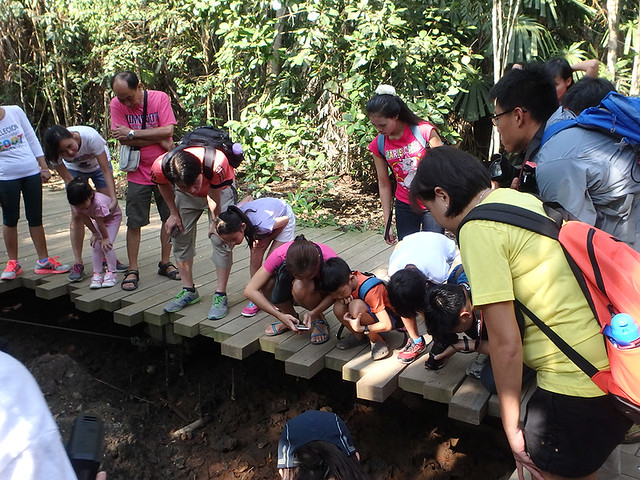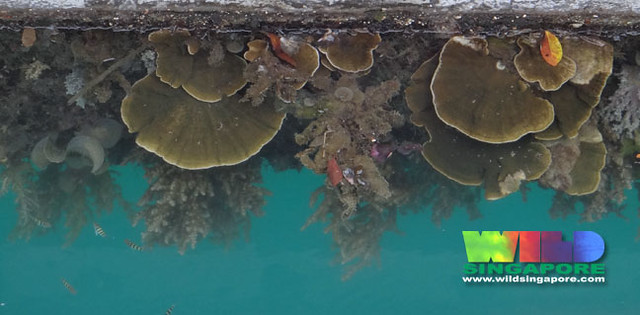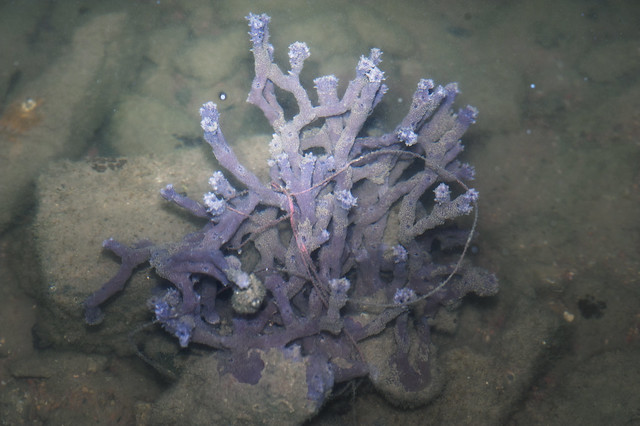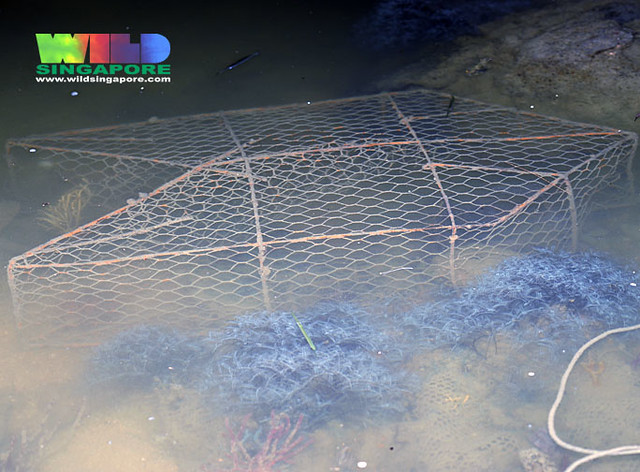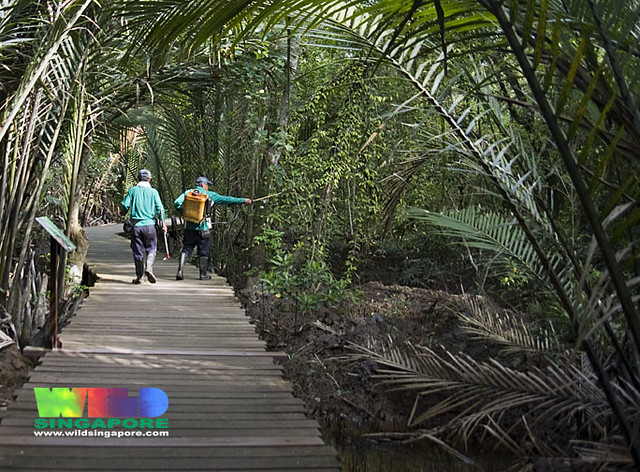 |
| Along the Changi boardwalk over water, there is often a dense row of fishing rods and traps in the water. |
I firmly believe that the public needs to be able to visit and appreciate some of our wild places. This is important because a love for nature is best nurtured through field trips, guided walks and a direct experience.
Boardwalks are a great way to allow ordinary people easy access. As a volunteer with the Naked Hermit Crabs, I've personally seen how children (and adults) light up with delight when exploring nature at the boardwalks at Chek Jawa and Pasir Ris. I believe such experiences can help inspire more Singaporeans to appreciate and protect our wild places.
But boardwalks can also have unintended impacts: during construction and afterwards.
Ecologically sensitive boardwalk construction
Even with promises of 'careful' construction, my observations of how the Berlayar Creek boardwalk was built in 2011 shows how construction can be anything but ecologically sensitive. Earlier media reports on the Berlayar Creek boardwalk assured that "construction work would be carried out carefully to ensure that the ecosystem would not be affected". The 960m Berlayer Creek Mangrove Trail is touted as an "'Eco-Educational' mangrove trail starts with a lushly landscaped Entrance Plaza at the open area surrounding the future Labrador Park MRT Station."
However, in Mar 2011 I saw an astonishing extent of large steel girders have been placed very close to one another along the entire boardwalk route.
The entire structure was large enough to support three large cranes, plus lots of other large equipment.
In July 2011 I was astounded at the progress of the construction at Berlayar Creek for the boardwalk. The humungous steel girders pounded into the shore seems to only be to allow the huge machinery to construct a much narrower boardwalk!
Here's a closer look at the wide, huge, rusting steel girder structure supporting heavy machinery, and the more slender grey structure that looks like the boardwalk itself. Indeed, later on, the steel girder structure was removed, leaving the more slender boardwalk behind. More about the issues surrounding the Berlayar Creek boardwalk.
Ecologically sensitive boardwalk maintenance
Later on, I discovered that the Berlayar Creek boardwalk maintenance programme included regular applications of anti-fouling paint on the enormous 'legs' of the boardwalk.
Anti-fouling paint have terribly damaging impacts on marine life. From wikipedia: "Anti-fouling paint have contained organotin compounds such as tributyltin, which are considered to be toxic chemicals with negative effects on humans and the environment. Tributyltin compounds are moderately to highly persistent organic pollutants that bioconcentrate up the marine predators' food chain. One common example is it leaching from marine paints into the aquatic environment, causing irreversible damage to the aquatic life." There are less toxic alternatives, but all anti-fouling treatment is toxic (otherwise it will not prevent fouling).
Just around the corner from the Berlayar Creek boardwalk, Marina at Keppel Bay does NOT apply anti-fouling on their pontoons and actually allows beautiful marine life to settle there. Here's what the pontoons at Marina at Keppel Bay look like: with hard corals, soft corals and lots of fish and other marine life associated with reefs.
Wouldn't it be so much better if lush marine life can also be allowed to grow on the 'legs' of the Berlayar Creek boardwalk? And if this element could have been considered in the planning and construction of the boardwalk?
Management of boardwalk use
Boardwalks within gated parks like Sungei Buloh and Chek Jawa are less likely to be misused. Such boardwalks live up to their intended purposes and do more good than harm.
For boardwalks outside gated parks, the funding for proper management must be factored in during planning so that they do not end up being grossly misused. Funding should cover outreach and education on proper usage, engaging the community on proper usage, developing volunteers to help with the management of the boardwalk, and patrols and enforcement against improper usage. If these elements are not in place, such boardwalks are likely to be grossly misused. And the boardwalk results in more harm to the marine ecosystem than good.
A key example is the Changi Coastal boardwalk. On a typical weekend when the tide is right, segments of the boardwalk over the water is completely taken over by fishermen who lay fishing rods, traps and lines in dense numbers. This is what I saw last weekend 10 Jul 2016. This is not very different from what I saw in 2009 in the same place. This also happens on other boardwalks. Here's some letters from the public about the conflict between fishermen and others on the boardwalks at Berlayar Creek, Changi and Punggol.
 |
| Yellow arrows point to lines in the water attached to traps. These lines are placed on both sides of the boardwalk. |
Abandoned traps and lines also continuously kill wildlife until they are removed.
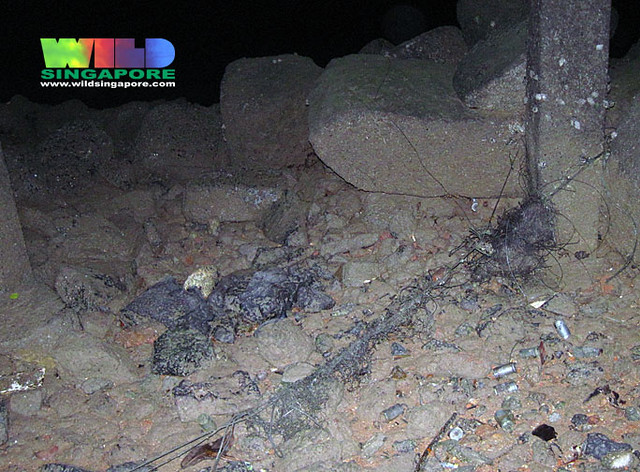 |
| Abandoned fish nets found under Changi Coastal boardwalk. |
 |
| Little Heron killed by a fishing line from the Bird Ecology Study Group blog. |
 |
| Barn owl entangled in a fishing line from the Bird Ecology Study Group blog. |
Boardwalks bring lots of people to a wild area. Numbers of and kinds of people who would ordinarily not be in that wild area. As a result unexpected protocols emerge that may eventually damage the ecosystem.
One example is how NEA regularly sprays the Chek Jawa mangroves and shores along the Chek Jawa boardwalk because, they say: "The population of Anopheles mosquitoes on Pulau Ubin makes it a malaria receptive area. Anopheles mosquitoes are the principal vectors of malaria. Due to the large number of visitors including tourists from malaria endemic countries and residents to the island, it is imperative that adequate control measures are put in place to prevent a localised malaria outbreak."
All these experiences and observations leads me to be wary of any plans to build boardwalks. We need to take a closer look to make sure the planning, construction, maintenance and management of the boardwalk take into account the long-term health of the ecosystem as well.
Upcoming coastal boardwalks
Plans for coastal boardwalks recently announced include:
- Round Island Route - media articles
- Pulau Ubin northern boardwalk - media articles
Related posts
- Berlayar Creek Boardwalk is open! with a review of observations of how it was constructed.
- Loving Chek Jawa to death? about NEA spraying of chemicals from the boardwalk to protect visitors from malaria.

